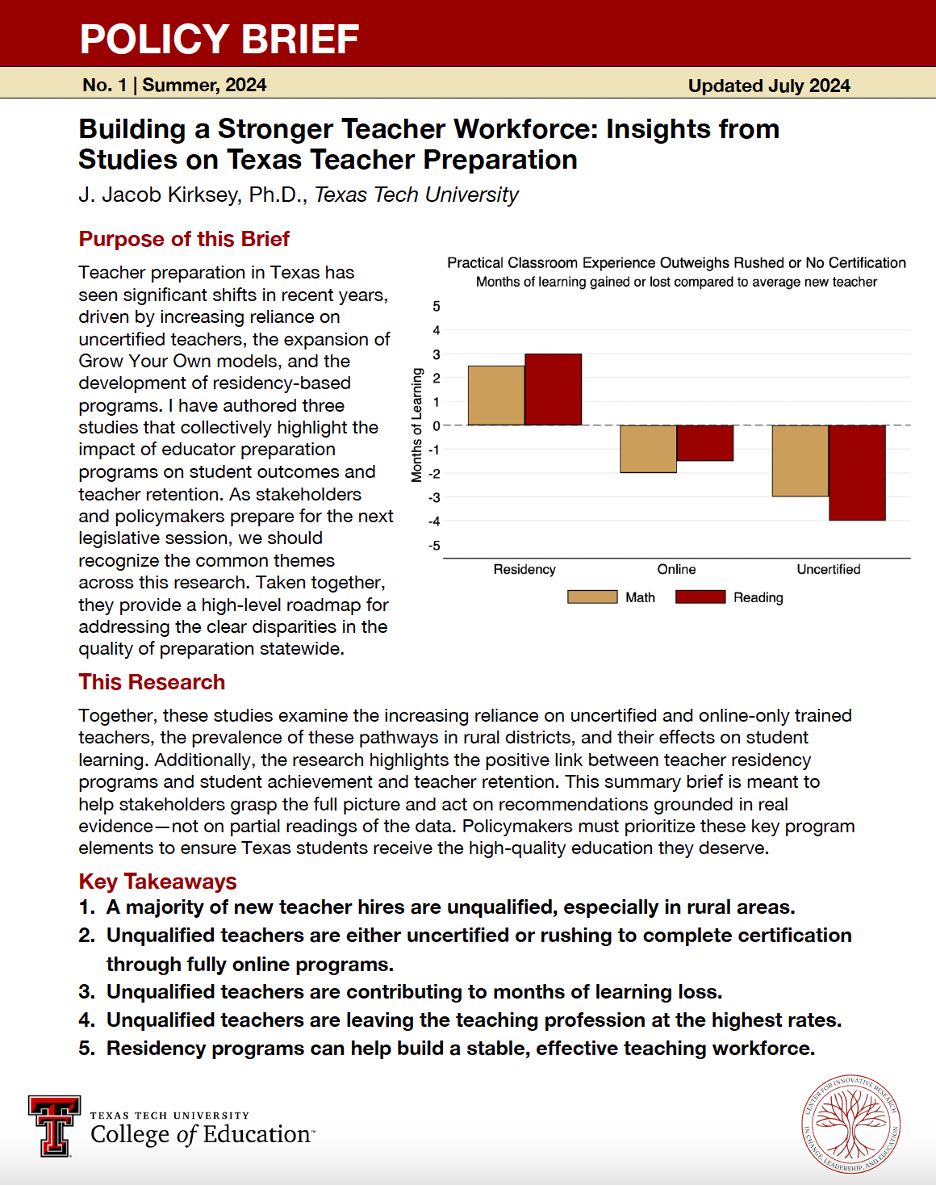Educational Leadership Policy Ph.D.
About the Program
The Ph.D. degree program in educational leadership policy prepares graduates to be critically engaged educational researchers and policy stakeholders. Graduates will be able to use data-driven methods to craft, enact and evaluate policy with a focus on making educational systems more equitable for students and families.
Our program prepares students to conduct rigorous, policy relevant research to inform policy and practice. Our program also prepares students for leadership positions in a wide variety of settings at local, state, national and international levels. Those include school districts, universities, government agencies, nonprofits and policy think tanks.
Program at a glance:
- Fully online
- 63 credit hours
- Interdisciplinary course of study
- Training in cutting-edge research methodology
- Theory-to-practice curriculum
- Flexibility to pursue in-depth research
Students receive rigorous training in leadership, organizations, policy theory, research methods, policy implementation and advocacy. An interdisciplinary course of study provides a strong foundation for understanding the importance of policy in the context of educational systems, stakeholder relations and social change. Students also examine the impact of economic, political, sociological and historical factors on education policy. The program seeks to bridge the divide between policy and practice.
Join Us
Become a leader in your school, organization or community! Join a group of educators and professionals that seek to use policymaking to improve educational systems and make them fairer for students and families.
Applications should be submitted online via the online application portal on the Graduate School website. There, you will input biographical and contact information and submit required application materials. You can check the status of your application within the same portal.
Application Materials
Applications should include:
- Educator personal statement
- Three letters of recommendation
- Current resume/CV
- Written response to prompt
- GRE scores
- Transcripts
There is a nonrefundable $75 fee for each application. Applicants should read the "Program Application" and "PhD Program Admissions" sections in the program handbook.
- Due to ongoing accessibility concerns, the Graduate School has suspended GRE test score requirements for applications through at least Summer 2026. For more information, please contact the Graduate School.
Tuition & Fees
Use the Student Business Services Tuition Estimator to estimate your costs.
FAQ
What is the admission timeline?
We recommend that for best consideration applicants submit their completed applications by January 15th for Fall admission. All Ph.D. applications will be reviewed after the deadline. Applications will not be accepted after this date. You can check the status of your application within the online application portal on the Graduate School website.
What is required for admission?
Please see the Program Handbook sections "Graduate School Application" and "PhD Program Admissions" for a complete list and explanation of the application requirements for the PhD in Educational Leadership Policy.
Do I need a master's degree for this program?
Applicants are strongly encouraged to have a master's degree, but possible exceptions will be evaluated on a case-by-case basis.
How much does it cost?
Use the Student Business Services Tuition Estimator to estimate your costs.
Can I pursue this program if I am living abroad?
Yes.
How is the program structured?
The Educational Leadership Policy degree requires 51 hours of coursework and 12 hours of dissertation research for a minimum of 63 hours of total doctoral coursework. The program is interdisciplinary, meaning it will integrate curriculum from different departments.
Can I enroll in this program while working?
Yes — this program can be completed while working full time. The coursework portion of the program lasts three years, with students taking two courses per semester, including the summer term. The dissertation phase begins after coursework ends and is designed to meet the students' schedules and availability.
Where do I apply?
Applications should be submitted online via the online application portal on the Graduate School website.
| TechLEAD | M.Ed. with Policy Concentration | Ed.D. | Ph.D. |
|---|---|---|---|
| Prepares working teachers interested in pursuing careers as principals in Texas | Prepares graduates for non-certified employment positions or to continue to a doctoral degree | Improves and enhances the skills of executive school leaders | Prepares graduates to be critically engaged educational researchers and policy stakeholders |
| Online delivery Learn More About TechLEAD |
Online delivery Learn More About the M.Ed. |
Online delivery Learn More About the Ed.D. |
Online delivery Apply Now |
| Become a principal or other district leader | Work in education, government, non-profits, advocacy groups, etc. | Administrative leadership in educational institutions, e.g. school districts | Focus on scholarly practice, research, or teaching at university level |
| Internship or field experience required | Internship not required, but practical application recommended | Internship or demonstration of proficiency in program evaluation | Practical experiences in research and scholarly communication |
| Capstone Project | Non-Thesis | Dissertation | Dissertation |
Ready to Learn More?
Tuition Cost Estimate
For the most accurate estimates of tuition please see the Cost Estimator located on the Student Business Services page. Below estimates do not account for potential scholarships, assistantships, or program-specific fees added to your bill. Please also remember that this not a tuition guarantee as the Texas Tech Board of Regents reviews tuition and fees annually.
| Texas Resident | Out of State Resident | International Student | |||
| On-Campus | Online | On-Campus | Online | On-Campus | Online |
| $2,867 | $2,687 | $5,297 | $2,687 | $5,372 | $5,192 |
Get a detailed tuition estimate ❯ - all fully online graduate students should select "TTU Online."
ExpandED Virtual Brown Bag Talks
Watch all the talks on-demand, hosted by the Educational Leadership Policy faculty.
Contacts
Dr. Gottlieb's research focuses on how education policy is used to expand opportunity via access to high-quality learning experiences, and how policy can improve student outcomes in the educational system. Currently, Dr. Gottlieb examines these issues in the context of STEM education policy, teacher workforce policy, and policy design and formation. Dr. Gottlieb is a former classroom teacher in Los Angeles, CA.
Jessica Gottlieb, Ph.D.
Associate Professor, Faculty Lead/Advisor
jessica.gottlieb@ttu.edu
806-834-5341
Dr. Wiseman is an expert at developing sustainable education policy based on large-scale assessment data to create equitable educational access and achievement. He also focuses on strategic planning, change management and classroom instruction. Wiseman is a former classroom teacher in both the U.S. and Asia.
Alexander Wiseman, Ph.D.
Professor
alexander.wiseman@ttu.edu
806-834-7193
Dr. Kirksey's scholarship is broadly focused on issues at the nexus of education and other areas of public policy, including immigration policy, child and family policy, and workforce development. He has published extensively on topics related to student absenteeism and truancy, inclusion and special education, the ripple effects of immigration enforcement, and teacher labor markets.
Jacob Kirksey, Ph.D.
Associate Professor
jacob.kirksey@ttu.edu
806-834-8473
Dr. Freeman’s research examines the connections between high school, higher education, and the workforce, focusing on students who take nontraditional pathways as they navigate these sectors. Additionally, her work explores the role of inclusive educational policies and practices in promoting more equitable outcomes for students with disabilities and English learners across the educational pipeline.
Jennifer Freeman, Ph.D.
Assistant Professor
jen.freeman@ttu.edu
806-834-3835
Dr. McGill’s research examines the budgetary practices of education leaders and how their decisions impact resource allocation patterns and student outcomes. He also studies the market dynamics that school choice policies generate, with a focus on how families make schooling decisions and how school leaders respond to competitive enrollment environments.
Dillon McGill, Ph.D.
Assistant Professor
Dillon.McGill@ttu.edu
806-834-4209
Faculty Spotlights
Associate professor Jacob Kirksey shared his findings with the Texas Legislature
With a public-school teacher shortage plaguing most of the U.S. for the past many years, especially in Texas, one solution was to put partially trained or uncertified teachers into classrooms. That trend has recently exploded, but not without some major drawbacks recently documented by one Texas Tech University researcher.
Read the full story on Texas Tech NowWiseman Elected to Research Journal Editorial Team
Dr. Alexander W. Wiseman has been elected to the team of Associate Editors of the American Educational Research Journal (AERJ) for the 2025–2027 volume years.

Overdeck Family Foundation Awards $1 Million to Five Studies Identifying Drivers of and Solutions To Chronic Absenteeism
Drs. Jacob Kirksey and Jessica Gottlieb will receive $186,037 to conduct a study estimating the impact of Texas’s teacher merit-based pay policy on student attendance and identify any specific teacher engagement and communication strategies, facilitated by the policy, that appear most effective for reducing student absenteeism. This study has the potential to heighten understanding of the role teacher quality and teacher-directed family engagement behaviors have on attendance and inform the creation and adoption of policies shown to be effective at improving teacher behaviors at scale.
New Faculty Spotlight: Dr. Jennifer Freeman
The Educational Leadership Policy Program is thrilled to welcome Dr. Jennifer Freeman as an Assistant Professor of Education Policy this fall semester. Dr. Freeman earned her Ph.D. in Education Policy from the Graduate School of Education at the University of Pennsylvania, where she also completed a master’s degree in Statistics and Data Science at the Wharton School. As a doctoral student, she was a National Science Foundation Graduate Research Fellow and an ECMC Postsecondary Career and Technical Education (CTE) Research Fellow.
Dr. Freeman has expertise in applying advanced quantitative methods to large-scale datasets from school districts and government agencies to evaluate policies and programs that span the educational pipeline and support access to learning and employment opportunities. Her research focuses on the connections between high school, higher education, and the workforce, with particular attention to students who follow nontraditional pathways as they navigate through these sectors. Much of this work centers on high school CTE students, community college attendees, and those transferring to four-year institutions. Additionally, Dr. Freeman’s research explores the role of inclusive policies and practices in promoting equitable outcomes for students with disabilities and English learners across the educational pipeline.
Some of her current projects include examining heterogeneity in high school CTE coursetaking and related postsecondary and workforce outcomes for English learners, evaluating how access to disability accommodations supports degree completion among community college students with disabilities, and exploring the impact of course-based undergraduate research experiences on academic and post-school success for community college transfer students in STEM fields.
Dr. Freeman’s research is motivated by her personal experiences navigating the community college transfer process and her work as an educator for high school students with disabilities. Her partnerships with school districts, community colleges, and educational organizations in California and Texas enhance the impact of her scholarship.
College of Education
-
Address
Texas Tech University, College of Education, 3002 18th Street Lubbock, TX 79409 -
Phone
(806) 742-2377 -
Email
educ.webmaster@ttu.edu









